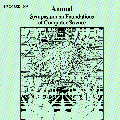Naively storing a counter up to value $n$ would require $\Omega(\log n)$ bits of memory. Nelson and Yu [NY22], following work of [Morris78], showed that if the query answers need only be $(1+\epsilon)$-approximate with probability at least $1 - \delta$, then $O(\log\log n + \log\log(1/\delta) + \log(1/\epsilon))$ bits suffice, and in fact this bound is tight. Morris' original motivation for studying this problem though, as well as modern applications, require not only maintaining one counter, but rather $k$ counters for $k$ large. This motivates the following question: for $k$ large, can $k$ counters be simultaneously maintained using asymptotically less memory than $k$ times the cost of an individual counter? That is to say, does this problem benefit from an improved {\it amortized} space complexity bound? We answer this question in the negative. Specifically, we prove a lower bound for nearly the full range of parameters showing that, in terms of memory usage, there is no asymptotic benefit possible via amortization when storing multiple counters. Our main proof utilizes a certain notion of "information cost" recently introduced by Braverman, Garg and Woodruff in FOCS 2020 to prove lower bounds for streaming algorithms.
翻译:将一个计数器储存到价值为美元的价值上, 需要美元\ omega (\ log n+\ log\ log (1/\ delta) +\ log (1/\ efslon) + log\ log\ log\ log\ log\ (1/\ efslon) + log (1/\ efslon) 美元就足够了, 事实上, 空间复杂性是紧的。 莫里斯研究这个问题的最初动机, 以及现代应用程序, 不仅需要保持一个计数器, 还要保持一个美元, 而不是美元大。 这引发了下面的问题: $k$( 1 ⁇ = = = = = = = $1 = = = = $ = = = = = = = = = i = = = = = 以 = = = = 以 = = 以 = 以 以 or or or = egal = egal egal = 以 可能 以 以 以 以 以 以 以 以 以 以 以 或 以 以 以 以 以 以 以 以 以 以 以 以 以 表示 表示 以 以 以 以 以 以 以 以 或 以 以 以 以 以 以 以 以 以 以 以 以 以 以 以 以 以 以 以 以 以 以 以 以 以 以 以 以 以 以 以 以 以 以 以 以 以 以 以 以 以 以 以 以 以 以 以 以 以 以 以 以 以 以 以 以 以 以 以 以 以 以 以 以 以 以 以 以 以 以 以 以 以 以 以 以 以 以 以 以 以 以 以 以 以 以 以



